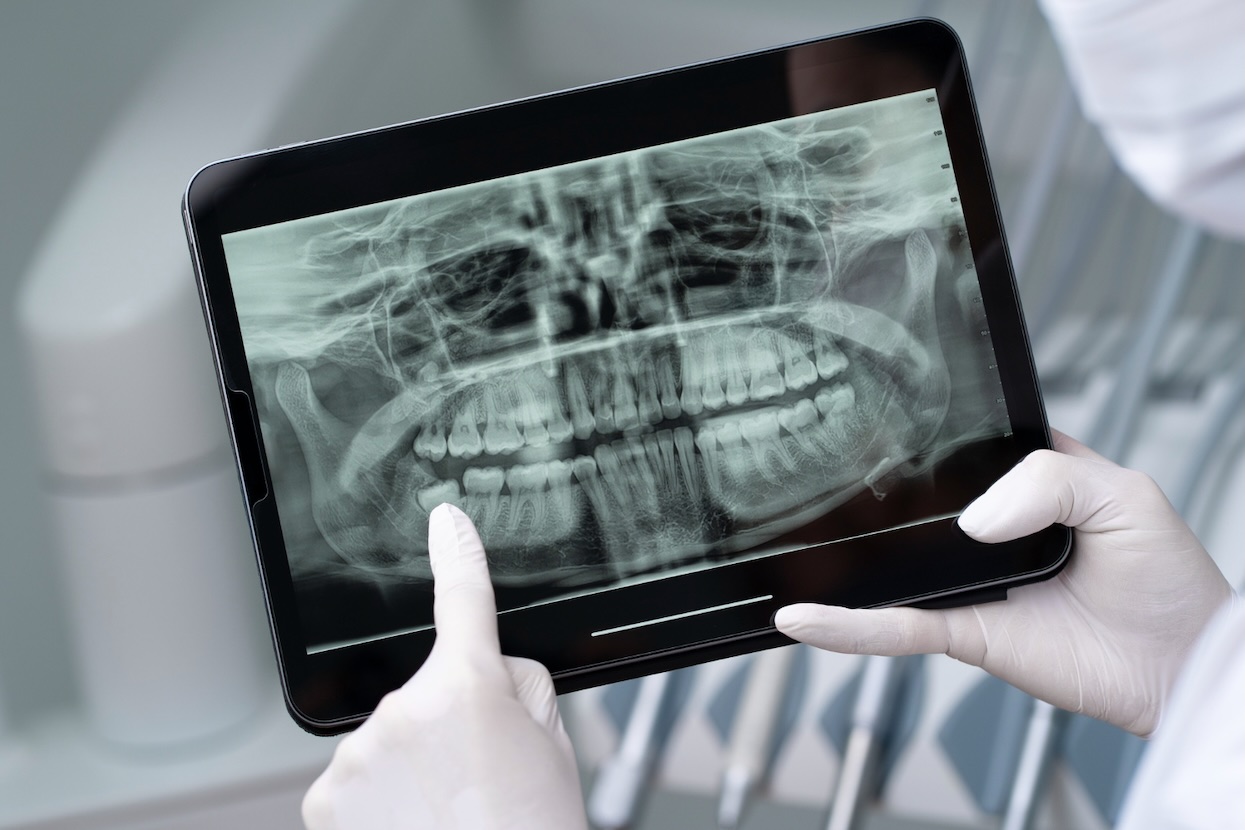If your orthodontist has recommended surgical treatment, you may be wondering why it’s necessary and how it can benefit you.
Not all orthodontic problems can be corrected with typical orthodontic interventions like braces or clear aligners. In some cases, skeletal issues related to jaw misalignment, breathing difficulties, and chronic pain require surgical orthodontics for a long-term, effective solution.
Surgical orthodontics, or orthognathic surgery, is a specialized procedure that corrects severe jaw misalignment and bite irregularities that traditional orthodontic treatments cannot fully resolve.
When performed in tandem with braces or clear aligners, it can dramatically improve oral function, facial balance, and overall health.
What Is Surgical Orthodontics?
Surgical orthodontics is a corrective jaw surgery that repositions the upper jaw (maxilla), lower jaw (mandible), or both to create better alignment, balance, and function.
This procedure is typically recommended when someone has a severe malocclusion (misaligned bite), jaw discrepancies, or structural abnormalities that make it challenging to chew, speak, or breathe.
Orthodontists also recommend surgery if a patient has significant skeletal issues that contribute to an imbalanced facial structure.
Unlike the usual orthodontic treatments, which focus on aligning the teeth and bite, surgical orthodontics corrects significant underlying skeletal issues. It is often performed in collaboration with an oral and maxillofacial surgeon, followed by braces or clear aligners to fine-tune tooth positioning.
Why You May Need Surgical Orthodontics
While every patient’s needs are unique, surgical orthodontics is typically recommended for those with significant skeletal issues that cannot be addressed with non-invasive interventions. Here are five common reasons why you might need orthognathic surgery.
1. Severe Jaw Misalignment (Skeletal Malocclusion)
If you have a severe overbite, underbite, crossbite, or open bite, surgical orthodontics may be necessary to restore proper jaw function.
While mild to moderate misalignments can often be corrected with braces or aligners, extreme cases require surgical jaw repositioning for a lasting solution.
Severe malocclusions can cause:
- Difficulty chewing or biting food properly
- Uneven wear on teeth, leading to dental damage over time
- Aesthetic concerns related to an imbalanced jawline
Surgical orthodontics can reposition the upper or lower jaw to establish proper alignment, better function, and a more balanced facial structure.
2. Difficulty Eating and Speaking
If chewing, biting, or speaking feels unnatural or challenging, a jaw misalignment may be the culprit. Surgical orthodontics can help patients who:
- Struggle to bite into foods properly due to malocclusion
- Experience pain or discomfort while chewing
- Have difficulty pronouncing certain words due to improper tongue and jaw placement
By realigning the jaws, surgical orthodontics makes eating more comfortable and speech clearer.
3. Chronic Jaw Pain and TMJ Disorders
Frequent jaw pain, headaches, or clicking and popping sounds in your jaw could indicate temporomandibular joint (TMJ) disorder, which often stems from jaw misalignment.
Signs of TMJ-related issues:
- Chronic jaw pain, facial discomfort, or earaches
- Frequent headaches or migraines
- Jaw locking or difficulty opening and closing the mouth
Surgical orthodontics can relieve excess strain on the TMJ, promoting a pain-free, balanced bite, and improved jaw function.
4. Sleep Apnea and Breathing Issues
A misaligned jaw can lead to airway obstruction and create common symptoms such as sleep apnea, snoring, and difficulty breathing — especially during sleep. Orthodontic surgery might be the solution if you have:
- A recessed lower jaw or narrow airway
- Been diagnosed with obstructive sleep apnea
- Difficulty breathing through your nose due to jaw position
Surgical expansion of your airway will improve breathing while significantly enhancing sleep quality and overall health.
5. Facial Asymmetry or Aesthetic Concerns
A misaligned jaw can impact facial balance and symmetry, leading to an appearance that some patients feel self-conscious about. Common concerns include:
- A recessed or protruding chin
- An asymmetrical jawline
- Uneven facial proportions due to jaw misalignment
Surgical orthodontics can solve these issues by enhancing facial harmony and confidence to give patients a more balanced, proportionate appearance.
The Orthobar Difference in Surgical Orthodontics: Your Path to a Healthier Smile
If you think surgical orthodontics could be the solution for you, don’t wait!
At Orthobar, we are dedicated to providing advanced, personalized orthodontic solutions that go beyond traditional care.
Our process uses cutting-edge 3D digital imaging and advanced scanning to create precise treatment plans tailored to each patient. If orthodontic surgery is your best solution, we partner with leading oral and maxillofacial surgeons to ensure expert care and optimal outcomes.
Schedule your complimentary consultation and take the first step on your orthodontic journey. Our team is here to answer your questions, assess your needs, and discuss your options for a fuller, more radiant smile.







